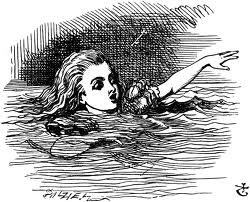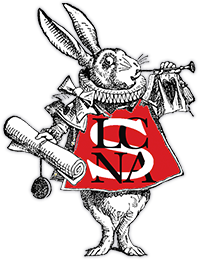 Why do adults read Alice’s Adventures in Wonderland? One Cambridge academic thinks is might be “a symbolic retreat from the disappointment of reality.” Really? Really?
Why do adults read Alice’s Adventures in Wonderland? One Cambridge academic thinks is might be “a symbolic retreat from the disappointment of reality.” Really? Really?
In yesterday’s online edition of the UK Independent, Rob Sharp, the arts correspondent, reported on a forthcoming book by Dr Louise Joy under the title “Why do adults read children’s literature? Blame modern life.”
Dr Louise Joy, a Cambridge University academic, believes classic children’s books, and the work they inspire, attract older readers because they give them things they cannot find in their everyday lives, including direct communication, tasty home-cooked food, and tolerance towards eccentricity. The researcher claims such books represent a “symbolic retreat from the disappointment of reality”.
“Books such as Lewis Carroll’s Alice in Wonderland and Roald Dahl’s James and the Giant Peach offer a world where self-consciousness is overthrown and relationships are straightforward,” says Dr Joy. “But relationships in the real adult world are often fraught by miscommunication and the impossibility of understanding one another properly.”
As we all know, in Wonderland relationships are entirely straightforward, no-one is self-conscious, and everyone understands each other perfectly. Could Dr. Joy have a point? But how would she explain the appeal of reading about junk food like cakes and comfits?
Sharp does give some room for dissenting voices and he quotes the current UK Children’s Laureate Julia Donaldson:
“Alice’s world can often be disconcerting and confusing in a dream-like way, something which struck me more as an adult than when I read it as a child […] It’s hard to generalise.”
Indeed.



I’ve been thinking about this for a few days.
How odd it is that anyone would pinpoint miscommunication in adult reality as being one of the reasons to appreciate Alice, since so much of both Alice in Wonderland and Through the Looking Glass deals with verbal confusion. Humpty Dumpty is out there making words be whatever he means them to be… Alice gets lectured about meaning what she says not being the same as saying what she means… There’s little straightforward about it.
I would actually venture to say, it’s because the world IS so similar to the bizarre logic of adult life– and certainly politics and business– that make it have additional relevance to adults.
Or maybe that’s just because in my marketing job I deal with impossible things all the time– like being asked to give my client a list of all the people who took their anonymous survey. 🙂 (Sigh.)
I found a longer account of Joy’s position here: http://www.cam.ac.uk/research/news/children%E2%80%99s-literature-an-escape-from-the-adult-world/
I’m still not convinced.